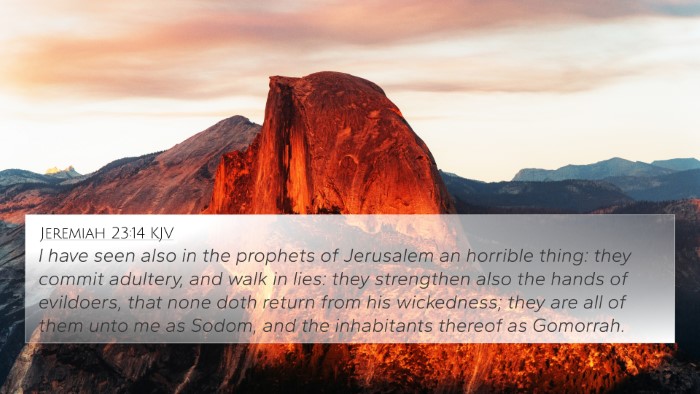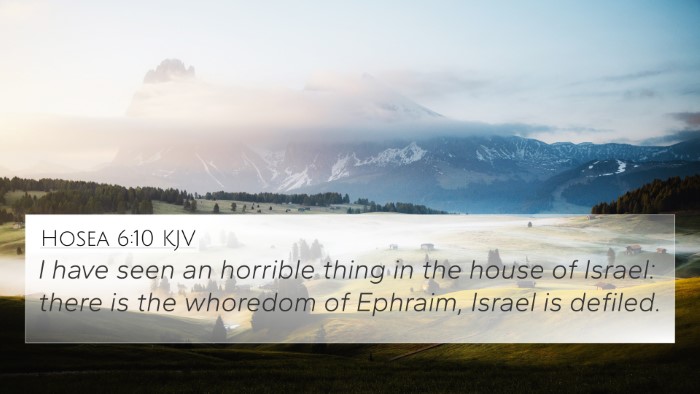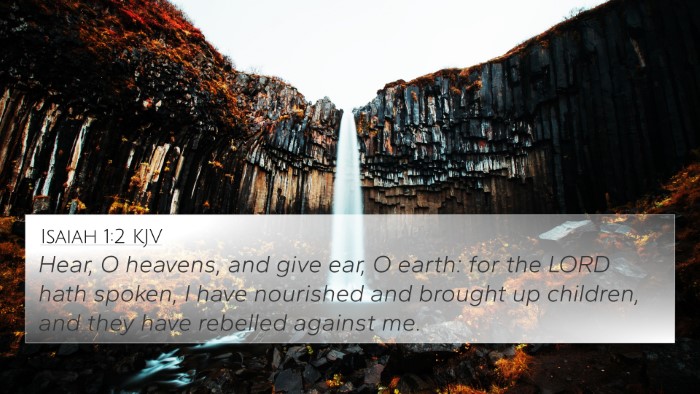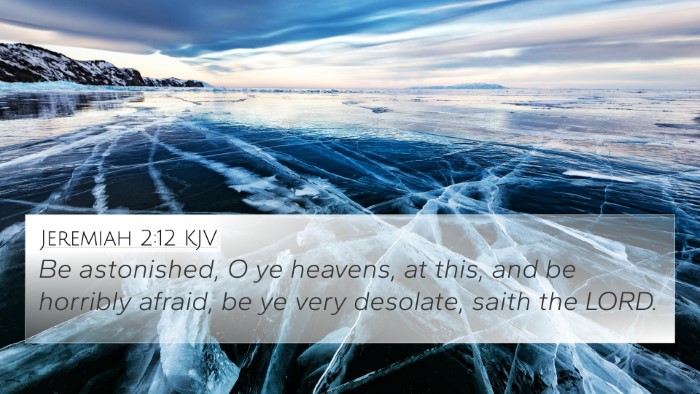Understanding Jeremiah 5:30
Jeremiah 5:30 reads: "A wonderful and horrible thing is committed in the land." This verse serves as a stark warning about the moral and spiritual decline of Judah. In this analysis, we explore the depth of this scripture by examining insights from several public domain commentaries, particularly those of Matthew Henry, Albert Barnes, and Adam Clarke.
Verse Meaning and Context
The prophet Jeremiah is lamenting the significant transgressions happening around him, signaling a failure to uphold God's commands. The dual descriptors "wonderful" and "horrible" indicate that the situation is both astounding and dreadful. Matthew Henry emphasizes the unexpected nature of such heinous acts amidst a people chosen to be God’s own. Albert Barnes elaborates on the idea that these acts — which integrate idolatry, injustice, and moral decay — reflect a profound betrayal of the covenant between God and Israel.
Adam Clarke points out that the term "wonderful" suggests an overwhelming surprise at the apostasy of the people, while "horrible" conveys the grave implications of their sin. The notion here is that God's people, who have been witnesses to profound grace and blessing, have become engaged in unspeakable wickedness.
Prophetic Dimensions
This verse stands within a prophetic framework, calling to account both individual and communal responsibilities to uphold righteousness. Henry explains that the "wonderful" acts of God—His miracles and the beauty of creation—contrast starkly with the pervasive evil being committed. The Lord’s intention is to elicit a response of repentance and regeneration among His people.
Cross-References and Connections
Jeremiah 5:30 echoes themes found in various other scriptures. Here are eleven related Bible verses that provide a broader understanding of its meaning:
- Isaiah 1:4: "Ah, sinful nation, a people laden with iniquity, a seed of evildoers!" This verse illustrates the sinfulness found in God's chosen people.
- Lamentations 3:34-36: "To subvert a man in his cause, the Lord approveth not." This emphasizes God's disapproval of injustice.
- Ezekiel 18:30: "Therefore I will judge you, O house of Israel, every one according to his ways." Here, God's call for repentance is direct and personal.
- Micah 3:8: "But truly I am full of power by the spirit of the Lord, and of judgment, and of might." A reminder of the righteousness that should accompany prophetic messages.
- Habakkuk 1:2-4: Discussing the iniquity and God's delay in judgment, mirroring the urgency felt in Jeremiah.
- 2 Timothy 3:1-5: "This know also, that in the last days perilous times shall come." This speaks to the ongoing problem of moral decay through time.
- Matthew 23:37: “O Jerusalem, Jerusalem, thou that killest the prophets, and stonest them which are sent unto thee!” reflects sorrow over a long history of rejecting God's message.
- Revelation 3:14-17: The call to be vigilant against spiritual lethargy resonates with the themes of warnings seen in Jeremiah.
- Romans 1:21: “Because that, when they knew God, they glorified him not as God, neither were thankful.” A description of the human condition when rebellion against God arises.
- James 4:4: “Ye adulterers and adulteresses, know ye not that the friendship of the world is enmity with God?” This illustrates the serious consequences of spiritual infidelity.
- 1 Peter 4:17: "For the time is come that judgment must begin at the house of God." This verse reminds us of God's justice and the need for His people to remain faithful.
Thematic Bible Connections
The verse serves as a catalyst for a deeper exploration of Biblical themes such as divine judgment, the need for repentance, and the serious nature of iniquity. The patterns of God's engagement with His people, their responsibilities, and the consequences of their choices weave a continuous thread through the texts of Scripture. Notably, the connections between the Old and New Testaments intensify our understanding of God’s character and His expectations.
Tools for Understanding and Cross-Referencing
Utilizing various Bible reference resources can enhance the study of passages like Jeremiah 5:30. Methods of cross-referencing Biblical texts enable readers to see how themes intersect across scripture. Some effective tools could include:
- Bible concordance
- Cross-reference Bible study materials
- Bible cross-reference guide
- Online Bible study platforms with cross-reference features
- Comprehensive Bible cross-reference systems
Concluding Insights
Jeremiah 5:30 is a poignant reminder of the serious call to fidelity in the relationship between God and His people. Exploring this verse through effective cross-referencing allows for a richer understanding of the scriptures as a unified whole. As believers seek to navigate their faith, the connections between biblical texts serve not only as a reminder of God’s expectations but also as an encouragement towards righteousness, renewal, and restoration.






